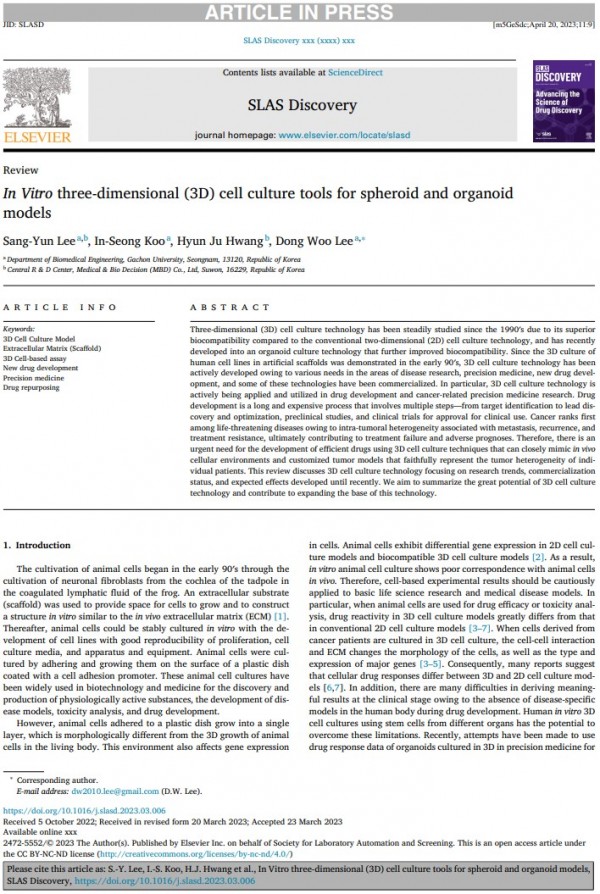논문 2023, SLAS Discovery, In Vitro three-dimensional (3D) cell culture too…
페이지 정보

본문
Abstract
Three-dimensional (3D) cell culture technology has been steadily studied since the 1990′s due to its superior biocompatibility compared to the conventional two-dimensional (2D) cell culture technology, and has recently developed into an organoid culture technology that further improved biocompatibility. Since the 3D culture of human cell lines in artificial scaffolds was demonstrated in the early 90′s, 3D cell culture technology has been actively developed owing to various needs in the areas of disease research, precision medicine, new drug development, and some of these technologies have been commercialized. In particular, 3D cell culture technology is actively being applied and utilized in drug development and cancer-related precision medicine research. Drug development is a long and expensive process that involves multiple steps—from target identification to lead discovery and optimization, preclinical studies, and clinical trials for approval for clinical use. Cancer ranks first among life-threatening diseases owing to intra-tumoral heterogeneity associated with metastasis, recurrence, and treatment resistance, ultimately contributing to treatment failure and adverse prognoses. Therefore, there is an urgent need for the development of efficient drugs using 3D cell culture techniques that can closely mimic in vivo cellular environments and customized tumor models that faithfully represent the tumor heterogeneity of individual patients. This review discusses 3D cell culture technology focusing on research trends, commercialization status, and expected effects developed until recently. We aim to summarize the great potential of 3D cell culture technology and contribute to expanding the base of this technology.
Three-dimensional (3D) cell culture technology has been steadily studied since the 1990′s due to its superior biocompatibility compared to the conventional two-dimensional (2D) cell culture technology, and has recently developed into an organoid culture technology that further improved biocompatibility. Since the 3D culture of human cell lines in artificial scaffolds was demonstrated in the early 90′s, 3D cell culture technology has been actively developed owing to various needs in the areas of disease research, precision medicine, new drug development, and some of these technologies have been commercialized. In particular, 3D cell culture technology is actively being applied and utilized in drug development and cancer-related precision medicine research. Drug development is a long and expensive process that involves multiple steps—from target identification to lead discovery and optimization, preclinical studies, and clinical trials for approval for clinical use. Cancer ranks first among life-threatening diseases owing to intra-tumoral heterogeneity associated with metastasis, recurrence, and treatment resistance, ultimately contributing to treatment failure and adverse prognoses. Therefore, there is an urgent need for the development of efficient drugs using 3D cell culture techniques that can closely mimic in vivo cellular environments and customized tumor models that faithfully represent the tumor heterogeneity of individual patients. This review discusses 3D cell culture technology focusing on research trends, commercialization status, and expected effects developed until recently. We aim to summarize the great potential of 3D cell culture technology and contribute to expanding the base of this technology.

 2023, cells, Cryobiopsy: A Breakthrough Strategy for Clinical Utilization of Lung Cancer Organoids
2023, cells, Cryobiopsy: A Breakthrough Strategy for Clinical Utilization of Lung Cancer Organoids 2023, Biomaterials , High-throughput organo-on-pillar (high-TOP) array system for three-dimensional ex vivo drug testing
2023, Biomaterials , High-throughput organo-on-pillar (high-TOP) array system for three-dimensional ex vivo drug testing